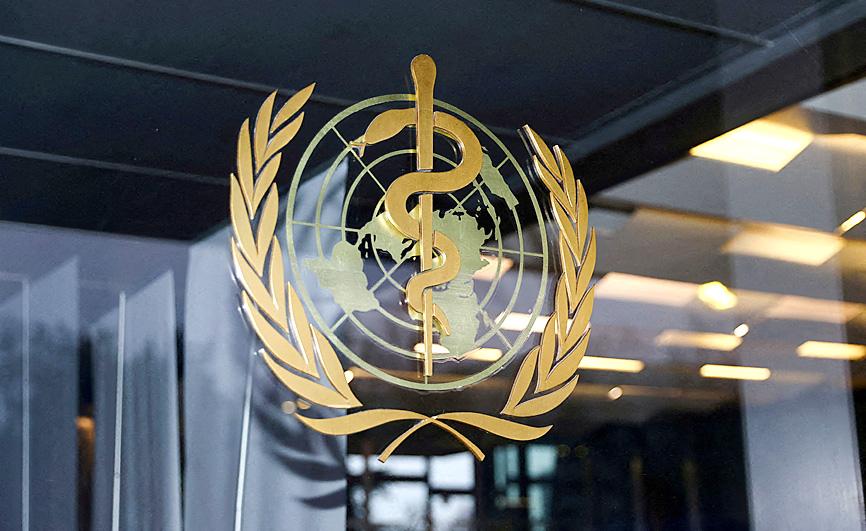British and US representatives during a WHO meeting on Friday voiced support for Taiwan’s participation in the global health organization, the Ministry of Foreign Affairs said.
“We recognize the need to strengthen vaccine confidence, and to address the role of mis- and disinformation. Accelerating vaccine uptake and demand is critical to achieving COVID-19 vaccination goals, to future emergency responses and to ongoing efforts to combat vaccine-preventable diseases,” said Loyce Pace, assistant secretary for global affairs at the US Department of Health and Human Services.
“In this regard, the United States appreciates the example of Taiwan in its COVID-19 response as well as its support to many around the world. We urge WHO to be fully inclusive of all partners, including Taiwan, as we take our collective work forward in responding to global health emergencies,” she said.

Photo: Reuters
According to information provided by the ministry, Danny Andrews, head of the health division at the British Permanent Mission to the UN Office in Geneva, Switzerland, told Friday’s meeting that “we also stress the inclusivity in WHO’s governance, given the impact of global health emergencies, we must draw on all voices and everyone with experiences to share to deal with health emergencies.”
Diplomatic ally the Marshall Islands expressed gratitude to Taiwan during the meeting.
“The Marshall Islands wishes to extend its most sincere gratitude once again to the WHO, and the numerous donor countries and partners such as the United States, the Republic of China (Taiwan) for their continued support and assistance to the Marshall Islands,” said Samuel Lanwi, Deputy Permanent Representative of the Marshall Islands to the UN Office in Geneva.
The ministry said that over the past few days allies, including St Kitts and Nevis, Nauru, Haiti, Honduras and Paraguay, have voiced support for Taiwan joining the WHO as an observer.
Officials representing Japan and the EU have also called on the WHO to be more inclusive.
Hiroki Nakatani, an adviser from the Japanese Ministry of Health, Labor and Welfare, said that “it is important not to make a geographical vacuum by creating a situation where a specific region cannot join WHO as an observer of WHA,” referring to the World Health Assembly, the decisionmaking body of the WHO.

MISINFORMATION: The generated content tends to adopt China’s official stance, such as ‘Taiwan is currently governed by the Chinese central government,’ the NSB said Five China-developed artificial intelligence (AI) language models exhibit cybersecurity risks and content biases, an inspection conducted by the National Security Bureau (NSB) showed. The five AI tools are: DeepSeek, Doubao (豆包), Yiyan (文心一言), Tongyi (通義千問) and Yuanbao (騰訊元寶), the bureau said, advising people to remain vigilant to protect personal data privacy and corporate business secrets. The NSB said it, in accordance with the National Intelligence Services Act (國家情報工作法), has reviewed international cybersecurity reports and intelligence, and coordinated with the Ministry of Justice Investigation Bureau and the National Police Agency’s Criminal Investigation Bureau to conduct an inspection of China-made AI language

LIMITS: While China increases military pressure on Taiwan and expands its use of cognitive warfare, it is unwilling to target tech supply chains, the report said US and Taiwan military officials have warned that the Chinese People’s Liberation Army (PLA) could implement a blockade within “a matter of hours” and need only “minimal conversion time” prior to an attack on Taiwan, a report released on Tuesday by the US Senate’s China Economic and Security Review Commission said. “While there is no indication that China is planning an imminent attack, the United States and its allies and partners can no longer assume that a Taiwan contingency is a distant possibility for which they would have ample time to prepare,” it said. The commission made the comments in its annual

CHECKING BOUNDARIES: China wants to disrupt solidarity among democracies and test their red lines, but it is instead pushing nations to become more united, an expert said The US Department of State on Friday expressed deep concern over a Chinese public security agency’s investigation into Legislator Puma Shen (沈伯洋) for “secession.” “China’s actions threaten free speech and erode norms that have underpinned the cross-strait ‘status quo’ for decades,” a US Department of State spokesperson said. The Chongqing Municipal Public Security Bureau late last month listed Shen as “wanted” and launched an investigation into alleged “secession-related” criminal activities, including his founding of the Kuma Academy, a civil defense organization that prepares people for an invasion by China. The spokesperson said that the US was “deeply concerned” about the bureau investigating Shen

‘TROUBLEMAKER’: Most countries believe that it is China — rather than Taiwan — that is undermining regional peace and stability with its coercive tactics, the president said China should restrain itself and refrain from being a troublemaker that sabotages peace and stability in the Indo-Pacific region, President William Lai (賴清德) said yesterday. Lai made the remarks after China Coast Guard vessels sailed into disputed waters off the Senkaku Islands — known as the Diaoyutai Islands (釣魚台) in Taiwan — following a remark Japanese Prime Minister Sanae Takaichi made regarding Taiwan. Takaichi during a parliamentary session on Nov. 7 said that a “Taiwan contingency” involving a Chinese naval blockade could qualify as a “survival-threatening situation” for Japan, and trigger Tokyo’s deployment of its military for defense. Asked about the escalating tensions